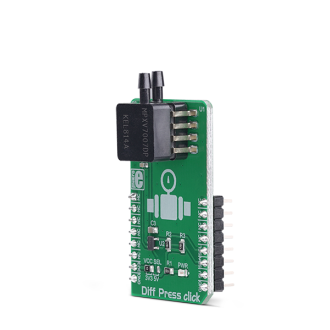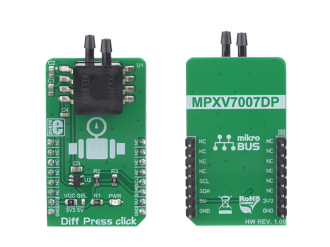
We strongly encourage users to use Package manager for sharing their code on Libstock website, because it boosts your efficiency and leaves the end user with no room for error. [more info]

Rating:
Author: MIKROE
Last Updated: 2020-12-10
Package Version: 1.0.0.0
mikroSDK Library: 1.0.0.0
Category: Pressure
Downloaded: 5230 times
Not followed.
License: MIT license
Diff Press Click is an accurate pressure sensor Click board capable of measuring differential pressure. This Click board utilizes a very precise differential pressure sensor from NXP, labeled as MPXV7007DP.
Do you want to subscribe in order to receive notifications regarding "Diff Press click" changes.
Do you want to unsubscribe in order to stop receiving notifications regarding "Diff Press click" changes.
Do you want to report abuse regarding "Diff Press click".


Library Description
The library contains a function for setting a reference output voltage which can be 1030mV, 2046mv, 3070mV or 4096mV.
Key functions:
uint16_t diffpress_getAdcData( void ) - reads raw ADC data from devicefloat diffpress_getPressureDifference( void ) - calculates pressure difference from raw ADC dataExamples description
The application is composed of the three sections :
void applicationTask( )
{
pressureDifference = diffpress_getPressureDifference( );
FloatToStr( pressureDifference, text );
mikrobus_logWrite( "pressure difference : ", _LOG_TEXT );
mikrobus_logWrite( text, _LOG_TEXT );
mikrobus_logWrite( " kPa", _LOG_LINE );
Delay_ms(100);
}
Other mikroE Libraries used in the example:
I2CUARTConversionsAdditional notes and information
Depending on the development board you are using, you may need USB UART click, USB UART 2 click or RS232 click to connect to your PC, for development systems with no UART to USB interface available on the board. The terminal available in all MikroElektronika compilers, or any other terminal application of your choice, can be used to read the message.